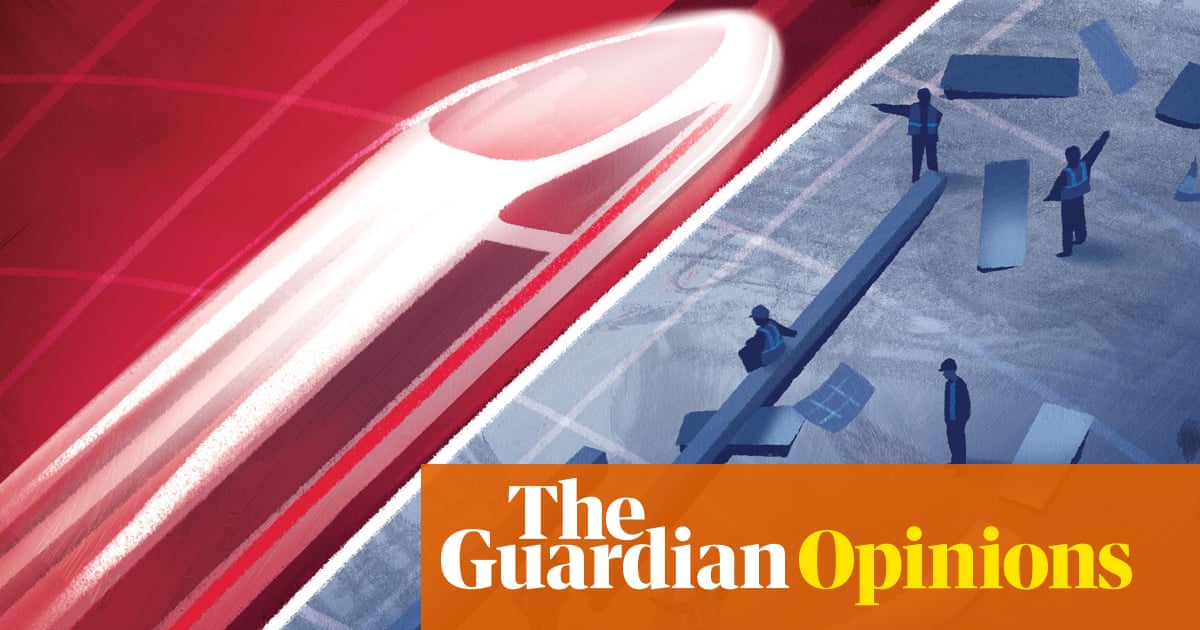Afew months ago, I travelled with my six-year-old daughter toHong Kong. As we made our way out of the airport and boarded a train, we shared a brief moment that gave me pause to reflect on how different her conception of the world will be from the one I grew up with. We sat down on immaculate seats, surrounded by LED screens. She looked around and said: “Wow Daddy, we don’t have trains like this back in London.”
As the week wore on, and she pointed out other things that she had never seen back home, her comment about the high-speed train took on a broader resonance. Used to Britain’s strained and crumbling public transport, my little girl had identified how economic power has migrated to a different model of capitalism over the past generation.
When I was growing up in the heady,Cool Britannia eraof the 1990s, Britain almost seemed like the apex of global civilisation. The only place ahead on its developmental trajectory was the US. And even if MTV or Hollywood presented it as the shining city on the hill, the smart kids knew it was really just Rome to Britain’s Greece.
In school, we learned how Britain, the birthplace of industrialised capitalism and parliamentary democracy and long the colonial ruler of placesincluding Hong Kong, had created an ideal form of society that was the model for everywhere else. When we told the story of how capitalism emerged, it was through the enclosure of medieval English villages and the growth of the Industrial Revolution’s “dark satanic mills”. When we spoke of the rise of democracy, it was through the nobles holding King John toMagna Cartaor Oliver Cromwell cementing the power of parliament.
Britain, the US and some parts of western Europe were the “developed world”. Everywhere else was “developing”. And development was a one-way road. The various crises we saw on the news engulfing distant lands in Africa, Asia or the Middle East were framed as a painful step in the maturing process that countries passed through in order to become societies like Britain.
This is not the world that British children growing up in the 21st century are now experiencing.Our trip to Hong Kong was a stark reminder of this. Back in 2014, the Chinese island city-state was named the overseas destination that most young British professionalswanted to relocate to. In second place was Dubai. Today, entiretelevision programmesare devoted to the subject of young Brits moving to “DXB”, alongside other Arab cities such as Abu Dhabi and Riyadh.
In Saudi Arabia, Mohammed bin Salman is pushing forward with his sci-fi vision forthe Line– a futuristic, AI-powered linear city, where smart technology will connect inhabitants moving between two parallel mirrored skyscrapers that stretch across 170km of desert. Meanwhile multiple UK governments have been trying and failing for years to advance plans for a high-speed rail line, HS2.
The affection young British influencers show for places that are still ultimately autocratic, no matter how much gloss and ring-lighting they use, is hardly surprising. The football clubs British kids support might be owned by Gulf royalty. The films they watch might look as though they take place in LA but areshot in the UAE. The idea that these are the places you now go to if you want to “make it” has become almost as ubiquitous as the idea of following the “American dream” was a generation ago.
What does this shift in the axis of our global order mean politically? As the historian Quinn Slobodian detailed in his 2023 bookCrack-Up Capitalism, Hong Kong long functioned as a utopian ideal for free-market radicals who sought to push a vision of capitalism that worked best without the constraining demands of mass democracy. Even Donald Trump, in his nativist justification for a trade war with China, often betrays the envy he feels towards itsability to crush dissentand suppress wages in a way that US constitutional traditions make more difficult.
In Britain, it has become more common for our politicians and journalists to cite their admiration for the emergence of technologically advanced, politically repressive states in what was once called the “developing world”. The former British prime minister Boris Johnson travelled to Riyadh in Februaryand stated: “Saudi Arabia is a country where things are happening with incredible speed and decisiveness. Frankly, we need to learn that in the UK.” About the same time, the Telegraph journalist Isabel Oakeshott wrote a gushing piece about moving to Dubai for cheaper private school fees, saying that “unlike angry, divided Britain, Dubai is the ultimatemulticultural success story”.
The idea that capitalism might work best with limited, or even nonexistent, democracy is quietly becoming more acceptable. Just last week, Oakeshott’s partner, Reform UK’s deputy leader, Richard Tice, said Britain should “aspire to” the low crime rate and widespread national pride found in Dubai. That the Emirati city is an absolute monarchy – regularly criticised byhuman rights organisationsfor imprisoning journalists, lawyers and political dissidents with little concern for the public’s right to freedom of expression – appeared to be of little concern to Tice or others on the conservative right who celebrate the city’s “booming metropolis”.
With our political and media elites now openly celebrating draconian regimes, it is likely that my daughter’s generation will grow up receiving a different message about the importance of Britain’s democratic “traditions”. According to a Channel 4 study from earlier this year,52% of gen Zersfelt the UK would be a better place “if a strong leader was in charge who does not have to bother with parliament and elections”. Unless our leaders start to promote an alternative vision of how society could function, and Britain’s place in a world where the west is no longer “best”, more and more of our young people will have the feeling that the future lies elsewhere.
Kojo Koram teaches at the School of Law at Birkbeck, University of London, and writes on issues of law, race and empire
